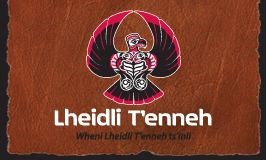Members of the Lheidli T'enneh Band will be voting on effectively the same agreement they rejected nearly a decade ago when they cast their ballots this fall.
There will be some modifications, as some monetary transfers are adjusted for inflation and some of the legal and technical aspects are updated.
But other than that, it's the same deal band members turned down in 2007, Nick Crisp, a negotiator with the B.C. Ministry of Aboriginal Relations and Reconciliation said during a presentation Tuesday to the Prince George Treaty Advisory Committee.
It drew approval from less than half those who voted, well below the 70-per-cent threshold that had been set for the proposal to pass.
But band leadership asked for a second attempt after determining band members wanted more information on the proposal, a 221-page document.
"There was a great deal of uncertainty at the time," Crisp said.
The Nisga'a agreement notwithstanding, it would have been the first modern treaty to go forward had it been approved.
If the proposal is rejected this time, there won't be a third vote, but the threshold for the coming vote will be 50 per cent plus one, Crisp said.
Dates and locations have been set for four voting opportunities, beginning on Oct. 15 at the Vancouver Native Friendship Centre and followed by Oct. 18 at the Crest Hotel in Prince Rupert.
Local opportunities are set for Oct. 21 at the band's administration office and Oct. 22 at the Coast Inn of the North.
Community meetings are also planned over the coming months, including one on Sat., April 23 at the Civic Centre, 10 a.m. to 4 p.m.
If approved by the membership, ratification would follow in the B.C. legislature and by parliament in Ottawa, a process that would take two to three years.
Among the facts and figures presented to the PGTAC, the Lheidli T'enneh will gain law-making authority over 4,275 hectares of treaty settlement lands in terms of roads and rights of way, forest resources, water, fisheries, wildlife, migratory birds, environmental protection and culture and heritage.
In each of those areas, the agreement also sets out which level of government will take precedence - Lheidli T'enneh or federal-provincial - if there is a conflict.
"There are instances in the final agreement where it states that Lheidli law will prevail in regards to that subject area but there is an equal number of sections where federal or provincial law will prevail," Ben Clermont, a negotiator for the federal Ministry of Indigenous and Northern Affairs said.
The band, made up of slightly less than 350 members, would also receive a capital transfer of $13.2 million less repayment of nearly $6 million in outstanding loans over 10 years, $12.1 million in one-time funding for such items as treaty management, capacity building, and fisheries management, $1.8 million a year for programs and services, and $400,000 a year for 50 years - indexed to inflation - for resource revenue sharing.
The PGTAC is made up of local politicians from the Fraser-Fort George and Bulkley-Nechko Regional Districts.



